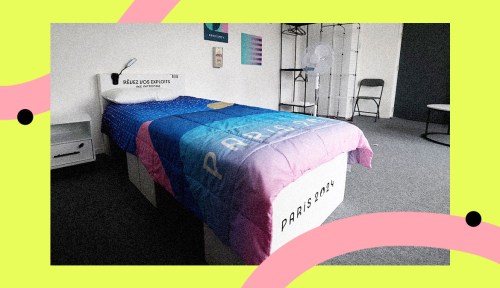Our editors independently select these products. Making a purchase through our links may earn Well+Good a commission
The Olympics’ Cardboard Beds Are Billed as ‘Anti-Sex,’ but They Might Present a Bigger Problem for the Athletes
Experts explain how sleep affects recovery and performance in light of athletes posting about uncomfortable cardboard beds at the Olympics.

When you think about where Olympic athletes sleep, visions of cushy king- and queen-size beds may dance through your head. But the reality is a little less glamorous: The single-size beds at the Paris Olympics are actually made of cardboard.
The beds first got attention at the 2020 Tokyo Games, with athletes speculating the material is meant to keep sexual activity in the Olympic Village at bay. But they actually serve a greater purpose, and that’s sustainability. A recent TikTok on the Olympics’ official account explains that the sustainable beds are 100 percent made in France and will be fully recycled after the Games, in an effort to keep the event as low-waste as possible.
While rumors about the bed discouraging sexual activity have mostly been dispelled (they are providing condoms at the Olympic Village, after all), athletes are still posting videos of themselves jumping on the beds to test their firmness and stability. The bed does consist of three modules to help athletes adjust its firmness level and length, per the TikTok, but how comfortable are these sleeping arrangements really for athletes who need rest at such a pivotal moment in their careers? (Not very, according to a slew of athlete-posted videos.)
The reality is, poor sleep can affect muscle recovery and performance—two things of paramount importance when you’re competing at the highest level of your sport. Here’s a closer look at what can happen when an athlete’s sleep is compromised, according to experts.
How do muscles recover during sleep?
In order to get stronger, your muscle fibers have to tear on a microscopic level and when they grow back, you gain strength. This process primarily happens while you’re sleeping, so when you don’t catch enough zzzs, it isn’t able to happen properly—studies show that both mental and physical performance are impaired after a single night of sleep deprivation.
“Without sleep, muscles become more inflamed and begin to break down their own protein to provide building blocks—aka nitrogen and other protein components—to the rest of the body, which needs more protein to function during sleep deprivation,” says Ben Smarr, science advisor to Oura and assistant professor at UCSD Bioengineering & Data Science. “Sleep allows healing, but deprivation causes breakdown, making getting good sleep doubly important.”
Not only that, but when you deprive your body of its most regenerative process or if you get poor sleep, you’re taking away a key element of recovery. “Non-REM sleep is associated with the highest levels of growth hormone release during a day, allowing muscles to heal and grow,” says Smarr.
Research has shown that your body produces 95 percent of its human growth hormone for the whole day during slow wave sleep, which is the cornerstone of recovery. Remember those muscle tears? While you’re asleep, HGH helps repair them by way of protein synthesis (aka generating new muscle cells).
“If you don’t give yourself that opportunity to get into solid sleep, then you don’t repair those muscles,” says Emily Capodilupo, the director of analytics at WHOOP. If the muscles aren’t able to repair themselves, she explains that the micro tears can compound on each other, and turn into overuse injuries, which obviously no one wants.
What’s actually happening in your body when you sleep?
So what’s actually going on with your body as you snooze? “During sleep, the muscles are going through a regenerative process,” says Jeff Monaco, Gold’s Gym’s director of education. This is happening on a few different levels, most of which occur when you reach slow wave sleep. Everyone’s muscles repair during sleep, but the way they repair depends on how you’re working out.
“If an individual is engaged in heavy resistance training, the muscle fibers will suffer acute damage, and the body will response by rebuilding those muscle fibers stronger and larger,” says Monaco. “If an individual is engaged in endurance training, the body will respond by increasing the oxidative capacity of those muscle fibers through increases in mitochondrial density and size.”
In addition to aiding in necessary muscle repair after a workout, sleep is also important for keeping your endocrine, immune, and nervous systems in check, each of which are important to keeping your body working properly. “If these systems aren’t functioning at full strength, that means your muscles cannot function at full strength either,” says Monaco.
He points to a study that shows that fatigue in the central and peripheral nervous systems can result in muscle fatigue, even if you haven’t actually fatigued that muscle through a workout or some other type of exertion.
The bottom line
For athletes, rest is just as important as training itself. It gives the muscles time to recover and the mind a chance to recharge before the next big competition or event. Here’s hoping the athletes find their cardboard beds comfy enough to get good shut-eye during the Games…or that they hit “add to cart” on a cushy mattress topper ASAP.
Sign Up for Our Daily Newsletter
Get all the latest in wellness, trends, food, fitness, beauty, and more delivered right to your inbox.
Got it, you've been added to our email list.










